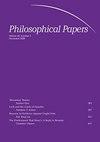解读非洲社群主义哲学中的生态女性主义环境主义与乌班图:人类中心主义的替代
IF 1.3
3区 哲学
0 PHILOSOPHY
引用次数: 13
摘要
摘要非洲生态女性主义环境伦理观应该是什么样子的问题在许多关于非洲环境伦理的哲学著作中仍然没有得到解答。我认为,如果认真考虑非洲社群主义哲学和乌班图中突出的价值观,非洲生态女权主义环境伦理应该是什么样子。在思考了非洲社群主义哲学和乌班图如何促进人类与自然各个方面的社群主义生活、关系生活、和谐生活、相互关联和相互依存之后,我揭示了如何从生态女权主义的环境视角来解读非洲社群论哲学和乌本图。我认为,在非洲哲学思想中,这种未被充分探索的生态女权主义环境伦理观可以被合理地视为人类中心环境主义的替代品。我敦促其他关于非洲环境主义的伦理理论家不要忽视这种非人类中心的非洲环境主义,这在非洲生态女权主义环境主义中很突出。本文章由计算机程序翻译,如有差异,请以英文原文为准。
Interpreting Ecofeminist Environmentalism in African Communitarian Philosophy and Ubuntu: An Alternative to Anthropocentrism
Abstract The question of what an African ecofeminist environmental ethical view ought to look like remains unanswered in much of philosophical writing on African environmental ethics. I consider what an African ecofeminist environmental ethics ought to look like if values salient in African communitarian philosophy and ubuntu are seriously considered. After considering how African communitarian philosophy and ubuntu foster communitarian living, relational living, harmonious living, interrelatedness and interdependence between human beings and various aspects of nature, I reveal how African communitarian philosophy and ubuntu could be interpreted from an ecofeminist environmental perspective. I suggest that this underexplored ecofeminist environmental ethical view in African philosophical thinking might be reasonably taken as an alternative to anthropocentric environmentalism. I urge other ethical theorists on African environmentalism not to neglect this non-anthropocentric African environmentalism that is salient in African ecofeminist environmentalism.
求助全文
通过发布文献求助,成功后即可免费获取论文全文。
去求助
来源期刊

Philosophical Papers
PHILOSOPHY-
CiteScore
2.10
自引率
0.00%
发文量
18
期刊介绍:
Philosophical Papers is an international, generalist journal of philosophy edited in South Africa Original Articles: Articles appearing in regular issues are original, high-quality, and stand-alone, and are written for the general professional philosopher. Submissions are welcome in any area of philosophy and undergo a process of peer review based on initial editor screening and refereeing by (usually) two referees. Special Issues: Topic-based special issues are comprised of both invited and submitted papers selected by guest editors. Recent special issues have included ''Philosophy''s Therapeutic Potential'' (2014, editor Dylan Futter); ''Aging and the Elderly'' (2012, editors Tom Martin and Samantha Vice); ''The Problem of the Criterion'' (2011, editor Mark Nelson); ''Retributive Emotions'' (2010, editor Lucy Allais); ‘Rape and its Meaning/s’ (2009, editor Louise du Toit). Calls for papers for upcoming special issues can be found here. Ideas for future special issues are welcome.
 求助内容:
求助内容: 应助结果提醒方式:
应助结果提醒方式:


